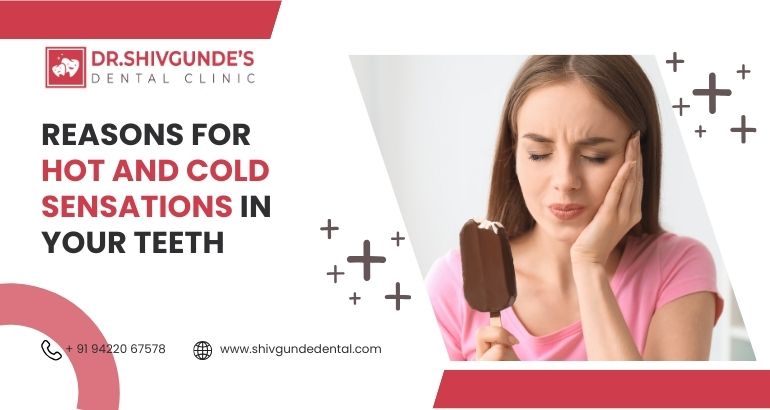Reasons For Hot And Cold Sensations In Your Teeth

Have you ever taken a sip of hot coffee or enjoyed a scoop of ice cream only to feel a sharp, sudden pain in your teeth? If so, you're not alone! Many people experience sensitivity to hot and cold foods, making everyday eating and drinking uncomfortable. But why does this happen, and what can you do about it? Let's explore the common causes of tooth sensitivity and how you can find relief. If you're looking for expert care, visiting the best dental clinic can help you effectively manage and treat this issue.
Common Causes of Tooth Sensitivity
Worn-Down Enamel: Your teeth are protected by a strong outer layer called enamel. Over time, enamel can wear down due to aggressive brushing, acidic foods, or grinding your teeth. When the enamel thins, the nerves inside your teeth become more exposed, leading to sensitivity to hot and cold temperatures.
Gum Recession: Your gums protect the roots of your teeth. However, if you have gum disease or brush too hard, your gums may recede, exposing the sensitive roots. Unlike enamel-covered teeth, exposed roots are highly sensitive to temperature changes.
Tooth Decay and Cavities: Cavities create holes in your teeth, exposing the inner layers to external stimuli. If you have a cavity, consuming hot or cold foods may trigger pain. Regular dental checkups at the best dental clinic can help catch and treat cavities early.
Cracked or Chipped Teeth: A small crack or chip in your tooth can expose the inner nerves, leading to discomfort when eating or drinking anything hot or cold. Even if a crack is not visible, it can still cause pain and should be checked by a dentist.
Recent Dental Procedures: If you've recently had a filling, crown, or teeth whitening treatment, your teeth may be temporarily sensitive. This usually subsides within a few days, but consulting a dentist is a good idea if the sensitivity persists.
How to Reduce Tooth Sensitivity
Use a Soft-Bristled Toothbrush: Brushing with a hard-bristled toothbrush can wear down enamel and irritate your gums. Switching to a soft-bristled toothbrush can help protect your teeth and reduce sensitivity.
Switch to a Desensitizing Toothpaste: Special toothpastes designed for sensitive teeth help block pain signals from reaching the nerves. Regular use can provide relief over time.
Avoid Acidic Foods and Drinks: Citrus fruits, sodas, and spicy foods can weaken enamel and increase sensitivity. Minimize your intake of these foods and rinse your mouth with water afterward.
Wear a Mouthguard if You Grind Your Teeth: Grinding or clenching your teeth, often due to stress, can wear down enamel and cause sensitivity. A custom-fitted mouthguard from the best dental clinic can help protect your teeth.
Seek Professional Dental Care: If sensitivity persists, it's important to visit a dentist. They can recommend treatments like fluoride applications, bonding, or gum grafting to cover exposed roots and reduce pain.
When to See a Dentist
While occasional sensitivity is common, persistent or severe pain may indicate a deeper dental issue. If you experience prolonged discomfort, don't ignore it! Seeking help ensures you get the right diagnosis and treatment.
Tooth sensitivity can be a frustrating and painful experience, but it doesn't have to disrupt your life. By understanding the causes and taking preventive measures, you can enjoy your favorite hot and cold foods without worry. If you're struggling with sensitivity, don’t hesitate to visit the best dental clinic for expert guidance and care. Your teeth deserve the best treatment, so take action today!

